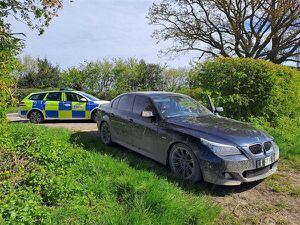How charity healed the scars of war for Shropshire airman
When Shropshire airman Alex Ford left the RAF in 2012 to look after his family, he started experiencing feelings of depression.

The 45-year-old, of Ruyton-XI-Towns, feared he had let down everybody he met during his six-month tour of Helmand the previous year, where he had come under fire and seen a colleague badly injured in an explosion.
Two soldiers from the army company he was with were killed and one in five were injured.
"I felt I didn't do enough out there to get it right," he said. "As if I wasn't strong enough, wasn't fit enough or wasn't clever enough.
That dusty land which for years brought us mostly bad tidings is now only occasionally mentioned in news bulletins.
But it is not over, and will never be over for the servicemen and servicewomen who day after day risked their lives over there doing their duty, nor for those who returned with physical and mental scars.
It will never be over for those who lost their loved ones, or for the children who lost a father they may never have had the chance to get to know.
While the world has moved on, Afghanistan continues to cast a shadow over people like Alex Ford, of Ruyton-XI-Towns, who left the RAF in 2012. He had done a six-month tour of Helmand province the previous year during which he had come under fire and seen a colleague badly injured in an explosion.
Superficially, Alex escaped unscathed. No doubt people looking at him would not be aware of any injury. They could not see the dark cloud which enveloped him, the fog, as he calls it, from which he could see no way out. With feelings of failure and guilt, he was in the grip of a desperate depression. Had he had a visible injury, people would have noticed it, and expressed sympathy. It would have been talked about.
Alex says mental health was not spoken about.
Calling our armed forces personnel "brave" and "heroes" is a cliche for which we in the media bear some culpability. What is meant to honour them and express our appreciation for their courage can also disguise something obvious, in that, with few exceptions, they are not impervious to fear, and are certainly not impervious to pain. They are not super men and women, but human beings, like the rest of us.
Yet they may feel that to speak about feelings of depression may be perceived as weak. So well done to Alex for speaking up, and raising the profile of mental health issues among service personnel.
There is help out there. He joined a psychological wellbeing service run by the charity Help for Heroes. It gave him a new perspective and has helped him see the bad times in their right light.
"This nagging doubt in my mind says 'you could've been better'. It was feelings of desperate depression; I couldn't see a way out of the fog that had enveloped me."
Mental health was rarely discussed during his time in the RAF.
"From my experience, it wasn't spoken about," said Alex.
"You didn't say that you were depressed or had mental health issues, but when conversations started about it then you found more and more people had actually had issues."
Alex's feelings of failure built after leaving the military. He had to care for a young daughter and a wife who had two prolapsed disks and had been medically discharged from the Army.
"I was angry, shouting, screaming, punching the wall occasionally, that sort of thing," he explained.
"Nothing physically violent but it was angry outbursts of shouting and then periods of desperate depression, really.
"Some people call it 'being low'. I've never done that, I've always said it was more like a fog. I know that the answer is out there, I just can't see it. If I was able to get 15, 20, feet higher, I'd be out of the fog."
In order to get help Alex joined a new Help for Heroes psychological wellbeing service.
He said the service helped him gain perspective and gives him reassurance that someone is there to talk to.
He said: "I emailed Help for Heroes at half past midnight after a bad couple of weeks and they called back first thing next morning.
"They got me to start keeping a mood diary to document how I'm feeling. It made me realise eighty percent of the day, you're feeling quite good about the world. The bad times you see become bigger than they actually are."
Dr Vanessa Lewis, head of psychological wellbeing at Help for Heroes said: "Many people think of wounded or injured servicemen as recovering from IED blasts or fire-fights, but the reality is that many more may need support with everyday mental health problems.
"We want all injured or sick veterans, from any conflict, and their families to know they can get help with managing their emotions, sleeplessness and other common psychological wellbeing issues as soon as they need it."
For more information on the service, call 01980 844300 or go to www.helpforheroes.org.uk/hidden-wounds





